The Poets of Uncertainty

19th Century artist and poet
Would you ask this man a twentieth century joke, oh, like...
What is the difference between a mechanical engineer
and a civil engineer?
Judging by the look of his eyes, the well of darkness in his mouth, and his priestly robes, I’d say he was heavily into certainties, such as that engineers build railway bridges and steam engines, while poets cultivate the soul, perhaps even in seances. If you asked him a twentieth century joke, he might not get it, you know.
So, what about the twentieth century poets? Well. I tell ya!
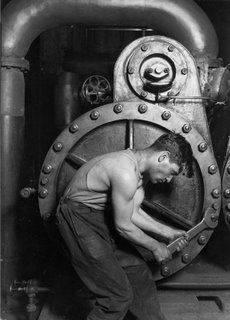
Neither civil nor mechanical engineers, twentieth century poets have always been on the front lines, making sure that the machinery of the system worked. Surely they can take a joke.
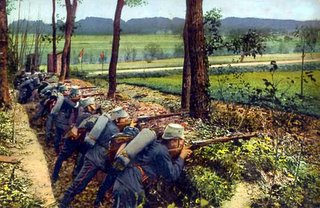
Take the Italian Futurists, for example. In a manifesto written in French, no less, they declared that poets had been wearing second hand poems for too long, and that it was time for them to create a new art, forged out of the beauty of speed and a glorification of war. Art, they declared, is nothing but violence, cruelty, and injustice.
And what, exactly, did they mean by second hand poems? What exactly did they mean by violence, cruelty, and injustice? This, perhaps:
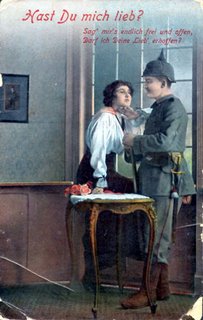
Tell me straight and tell me true:
Can I expect love from you?
This is a postcard of a kind that could be sent by a soldier at the Front back to the love of his life in Düsseldorf or Bremerhaven. Notice how the woman has been boxed into a corner by an antique table. Notice how the soldier looks like a bit of a ghost. Notice, in fact, how he is imitating the painting of a soldier on the wall. This is one of the earliest examples we have of the poetry of uncertainty.
The physicists didn’t catch up for twenty years.
When did the switchover actually occur between the poetry of certainty and the poetry of uncertainty? Fortunately, we have documentary proof that it happened pretty much overnight.
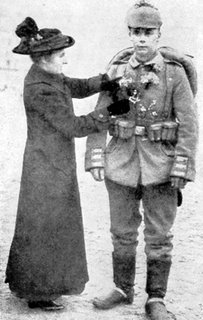
Notice how the mother is dressed in a nineteenth century seance, while her son, born just before the new century, is dressed for the new poetry.
Brilliant new metrics were developed. Dazzling displays of metaphoric bravado. Cavalry charges of imagery were unleashed on an unsuspecting reading public. For a short, dizzying time, the War to End All Wars looked like it was going to succeed so well, with such a display of new linguistic technologies that poetry would completely enter the world and never return to its original shelves of books. And it pretty nearly did.
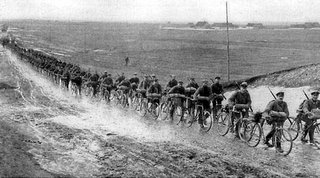
Futurism was the twentieth century’s first attempt to conceive of a new race: machine-extended man.
So, after all that, here's the answer to the joke we never asked Dante Gabriel Rossetti:
A mechanical engineer builds bigger bombs.
A civil engineer builds targets.
Some jokes you can’t even laugh at.
The thing is, poets have been into uncertainty for a long time. When the physicists discovered the idea, they came up with the notion that if a particle of light were divided in two, and one half travelled to the other side of the universe, it would know immediately whether the particle on this side of the universe had been extinguished.
Well, ya, guys. Like, we knew that. You should have asked.

by the Girl You Can’t Forget
“Roses may fade,” answered the maid, “clouds may turn sunshine to gloom,
But in my heart, though we’re apart, love for you ever will bloom.
Through weary years, through smiles and tears, you’ll find me faithful and true;
Dear heart, you’ll learn, when you return, that I’m still waiting for you.”
Now that we’re finally well out of the twentieth century and it is rocketing away from us at the speed of light, now that NASA has to eat its heart out, because we’re all already out of the solar system without even so much as a single broken wing tile, now, in fact, that the last millennial number-crunching apocalyptic gasp of the twentieth century is already past Alpha Centauri, it’s time to come clean about its obsession with science and order.
Guys, the poets were just playing with you. They might have convinced you that they were in the boudoir parting their lips to breathe perfume, they might even have penned a verse or two to help the old propaganda machine along, but if anyone fell for it, well, that was their own doing, wasn’t it. They wanted to.
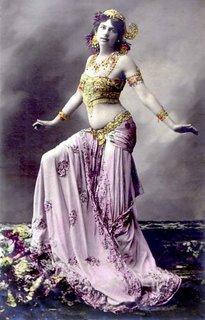
Physicists haven’t even caught up to Mata Hari yet. If the physicists caught onto her game, they’d have to conclude that a particle of light at the far edge of the universe was doing its darndest to get back home.
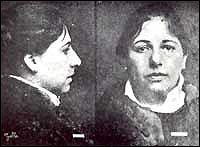
Almost Completely Transformed Into a French Matron
And realizing she is about to make the trip to the far side of the universe.
As the century went on, poets got a bit better at manipulating the apparatus that divided them into particles, and didn’t spend quite so much time in front of firing squads. Take Boris Karloff, for instance. A poet at heart, he found the best defence against the forces of certainty was to pose as an actor posting as Boris Karloff.
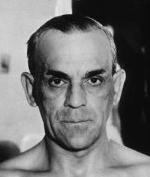
Notice how Boris’s head is a composite: smooth on top, puffed up around the eyes, chiselled out around the mouth, and those ears: lopsided. This is called putting together a face by committee.
For this, of course, he had to pay the perennial poet’s price. Here he is at one of the last of Dante Gabriel Rossetti’s seances:

Notice that he now looks a lot like Frankenstein, who was put together out of odds and ends and dead bodies lying around in the streets, stitched together and charged up with a good jolt of lightning. This is called science.
As the century went on, poets became more and more enamoured with the potential of futurist poetics to create a new race of humans. By mid-century, science had become an ever more popular pastime for the actualization of poetry in a world of physicality.
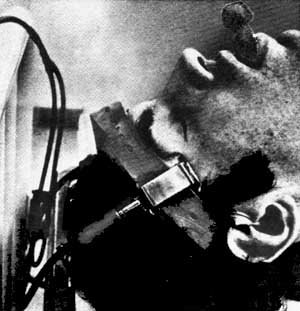
As futurism took a stronger and strong hold, this procedure was considered a safe, sure, and simple, even a miraculous, technique for curing Rossettism and fusing the particles of a poet’s consciousness into one indivisible whole, ready to observe both sides of the universe at once.
One of the earliest practitioners of the transfer of poetry from the world of words to the world of action was the American poet Ezra Pound. As he was an innovator, breaking new ground, he did find the journey a bit rocky, however.
To set the scene: in 1909 the young poet Ezra Pound goes to Europe for 2 weeks, to meet the poet W.B. Yeats, who he considered one of the twenty people alive at the time who had contributed anything to the world of letters.
At that time, Yeats was very popular for writing about Irish fairies.

Not, perhaps, to be confused with Irish Fairies
These fairies might look like they are cut out of cardboard, but I assure you that Sir Arthur Conan Doyle testified to their authenticity, and they rocketed the little girls who took the picture into international fame. A little uncertain? Well, I know what you mean. Still, they made a movie out of it, if that’s any reassurance.
Little did Pound know that he is going to stay for 60 years, and instead of writing about fairies, he is going to end up looking a lot like Boris Karloff.
You think I’m kidding? When Pound starts out, he looks like this:

Those were the days in which he wooed the beautiful Dorothy Shakespear, by dressing in trousers cut from a green velvet curtain and wearing a ring in his ear, like a pirate.

She had an eye for pirates
Pirates had an eye for her
In fact, Pound wrote his long poem, The Cantos, about civilization, himself, and Odysseus the pirate. He wanted it to be a poem containing history, a poem which did not tell people what to think but which presented fact set against fact set against fact, which could allow any thinking man to come to conclusions himself and thus be assured of their truth in a world full of other people seeking to manipulate him. Pound figured he had found a way to turn uncertainty into a greater certainty, but then he wound up on the far side of the universe.
You see, there are people who don’t want poets fighting their wars for them. In the Second World War, these were the people who tended to run armies.
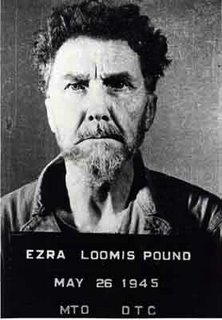
Ah, radio! There was a time, not so distant in the past, in which the operation of a machine required art, required a person to take into themselves a lot of technical information and then to animate that on an automatic level, to fill it, so to speak, with their life force. That’s what Pound was talking about.
Radar and sonar in WWII, for example. Pound’s time.
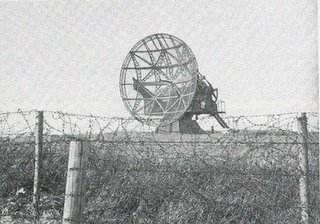
This artistic installation required a man to attune himself to the waves in a cathode tube and to interpret them the way a singer interprets Mozart on the stage, or the way in which a poet, any poet, is trying his or her damndest to humanize the inhuman, to make new humans, new puppets, new Frankensteins, out of the machines that threaten to extinguish us. In the alleyways between the temples and the factories of our cities of concrete and steel, within the asphalt and power wires and traffic, people have made intimate human environments.
In one of the most amazing examples of social engineering ever, the Concrete Division of the Gordon Lumber Company of Woodville, Ontario, has agreed to strip the veils of illusion from our eyes and show us the inside of one of their concrete trucks. On the outside, they might look like trucks, really big trucks, but if you click on one of those trucks (you’ll have to scroll down first), you’ll see a world of amazing comfort hidden deep inside. People, these are not the last days. These are the first! Try it!
Now, this is the kind of thing poets have been doing for a long time, without any concrete shielding. Here’s what Pound found when he went deep inside.
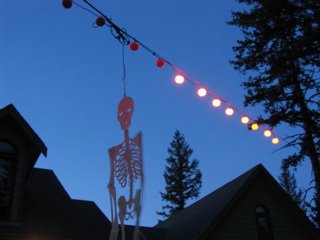
It started out innocently enough, back home in Philadelphia, in 1903, at the end of History, and even a few years earlier, when there was still a little bit of history left, Pound had been seeing dryads and nymphs in the woods. Like this:
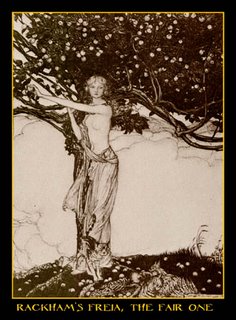
Mind Photograph taken by book illustrator Arthur Rackham.
Note her name, Freia. The German spelling of this name is Freya, and, wouldn’t you know: the companion radar system which accompanied the Würzburg radars in Denmark was a system called Freya. It was laid out on a Himmelbett, a bed in the sky.
That’s why Pound came to England: to see more of them.
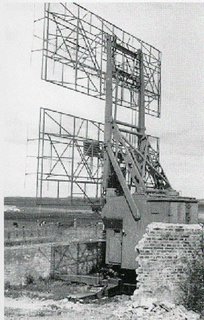
looking out over her field of cows
Notice how even this early in history, the human/machine transformation has been complete -- at a time when the physicists had still not built the atomic bomb to test the Futurist’s theories out in practice.
Having been born in the older century, the 19th, Pound thought he could get away with writing a long poem like a medieval frieze, a church altar, that started out in Hell, moved on to Purgatory, and ended up in Paradise, with angels singing, and all the people united in art. Well, he started off all right, in Hell. Then he went on to Hell, and he ended up handily, in Hell.
Such is the dilemna of quantum physics.
You see, Pound forgot what he knew as a poet, and started thinking as a physicist. He actually thought he was under some obligation to make the damn thing cohere.

As They Watch the Poets Erect their Freyas
Pound wound up in an insane asylum in Washington, D.C. (if there ever was an oxymoron, that’s gotta be it, folks), for broadcasting propaganda over Italian Radio during the Second World War to convince American soldiers (fighting the Italian army) to give up the war, to save America, not from defeat, but from dishonesty, and plain old-fashioned meddling.
After the war Pound was arrested by partisans, delivered to the American Army, imprisoned in a military prison outside of Pisa, and was eventually incarcerated for thirteen years in a mental hospital in Washington, D.C., as being incurably insane and thus unfit to stand trial. To the end, he insisted that no country can call itself free that does not maintain the ability to print its own money, independently of the influence of any bank, stock exchange, or any other nation. These beliefs were used as evidence against him.
Well, yeah.

Where Pound was Held for Broadcasting Poetry
Pound’s final words in the long poem of his life were:

Canto XX
At least he said it.
Such is the dilemna of quantum physics.
Next week: What Pound made, and the pears that remember him.
